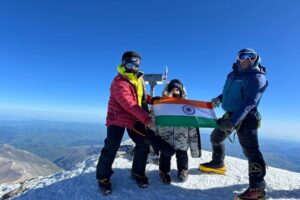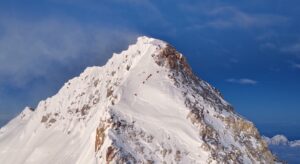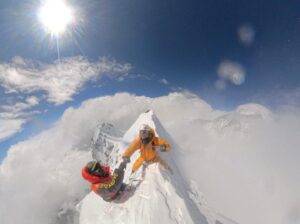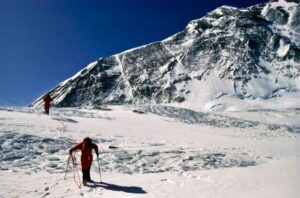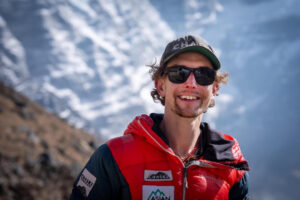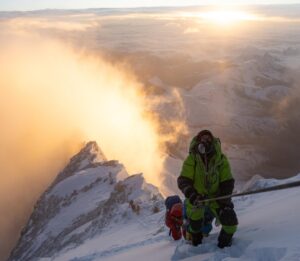What’s been going on with Marc Batard during this week of Everest summits?
Readers may recall that the former speed climber was undertaking one of the very few original projects on the Big E this season. First, he planned a no-O2 ascent to commemorate his 70th birthday. Second and most interesting, he wanted to set up a new, alternative route to the Western Cwm that avoids the dangerous Khumbu Icefall. Batard was also the climber who in 1988, sped up Makalu’s West Pillar on his own. That same year, he climbed Everest in a remarkable 22 hours 29 minutes.
We asked the veteran French climber for his comments on the recent speed ascent up Makalu, and about his progress on that new variation route via Nuptse. It seems that Batard is simply too burned-out to continue for now.
It’s all about the money
“I’m sorry but I lost motivation because of a lot of things,” he told ExplorersWeb. “The mountain is not respected anymore, [it’s about] the money, the helicopters…Maybe I’ll find my motivation again. For now, I am waiting for the Nepalese government to invite me to finish what I started, and where I spent a lot of money and time.”

The sons and the fathers: Left, Tenji Sherpa and Alan Batard; right, Marc Batard and Pasang Nuru.
Batard also referred to a “mess”, but he didn’t say whether this referred to Everest, his new route, or the FKT (Fastest Known Time) claimed on Makalu.
As we pointed out, Nico Miranda and Karl Egloff made an impressive ascent on Makalu without supplementary O2 or supporting Sherpas. The speedy pair hustled from Advanced Base Camp to the summit in 17 hours 18mins. Yet their climb is not really comparable to Batard’s. For one thing, he used a different route. And while he tried to go fast, his goal in 1988 was not an FKT — there was no such acronym at the time — but to minimize the time at altitude during his lonely ascent.
The issue on Everest is — complicated.
Batard’s French-Nepali team is connected by family ties. Batard climbs with his son Alan and friend Pasang Nuru Sherpa, who has also added his own son Tenji to the team.
Assisted by a small group of French guides, they started opening the new variation route last year. It went across the side of Nuptse and down to the Khumbu Glacier at around 6,000m. It was not an easy passage, but Batard planned to fix it with metal cables and bolts, almost like a European Via Ferrata.

A member of Batard’s team on the new route in spring 2021. Photo: Jean-Marc Demoz
Red tape
This season, when he arrived in Nepal, he encountered red tape. Nepal’s Department of Tourism considered that his route was not strictly on Everest, but on Nuptse, so they issued him a permit for the latter mountain. If he wanted to climb Everest, they told him that he needed another permit and that he would have to pay for it rather than get a freebie, as he’d been hoping.
The summit of Everest was his ultimate goal, so he didn’t understand the Nuptse decision. Mainly, he felt unfairly treated because he was working to help future climbers and workers avoid the risks of the Khumbu Icefall. He felt that the fee for an expensive Everest permit should be waived in this case.
Marc Batard said he will write about all these matters in a few days. But the underlying question is, what if the Nepalis don’t need (or even want) his route? Helicopters now transport the ropes to fix the route up Everest — as well as oxygen bottles, tents, and other items — above the Icefall. Air transportation has become one of the most thriving businesses related to the mountain.
In addition, the widespread use of oxygen from as low as Camp 2, and ample pre-acclimatization — either at home or on trekking peaks — means that climbers don’t need to pass up and down through the Icefall as often as before. According to a few courageous whistleblowers, we even hear how some climbers may fly to Camp 2 to avoid the Khumbu Icefall entirely.
Clearly, Everest has changed a great deal since Batard was last there. We look forward to his report.

